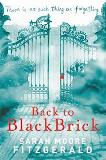There is no such thing as Forgetting
It is almost impossible for somebody who has been lucky enough not to have experienced the savage infliction of Alzheimer’s at first hand to understand just how devastating this horrible disease can be. It is all the more insidious because, insofar as I understand it, the person with Alzheimer’s often firmly believes that he or she is in the whole of their health. The real sufferers are the victim’s loved ones who watch their beloved literally disappear before their eyes while to the outside world the person is leading a perfectly normal life.
In an Author’s Note at the end of her remarkable, not to say ground breaking, book “Back to Black Brick”, Sarah Moore Fitzgerald writes:
“He (her father) was diagnosed with Alzheimer’s some years ago, a disease that slowly but relentlessly takes someone’s memory and identity away. It’s hard to describe the bleakness that I felt when I realised that gradually he was forgetting us all. Losing someone to Alzheimer’s is a very common experience, but one that remains poorly understood and difficult to talk about.”
She goes on the say when she started out to write the book, the writing was dominated by her own experiences but that her fictional characters took over with minds and personalities of their own and that “together they have helped me to remember that no-one who has loved you ever really goes away, and that adventure and discovery wait for us in unexpected places, perhaps especially during sad or difficult times”.
According to Cosmo, who hates his name, his grandfather is pretty much the cleverest man he has ever met, at least that is until he started to do strange things like talk to lamp posts or ask where the toilet in the house is. He decides to take a proactive role in trying to help his grandfather remember where and who he was but this meets with growing failure and he becomes frustrated. Then in a lucid moment his grandfather hands him the key to the South Gates of Black Brick Abbey and tell him to go through the gate. This Cosmo does and the first person he meets is Kevin, his grandfather, who is now only a teenager. Cosmo has travelled back in time.
This whole narration is extremely well handled by Fitzgerald and it is somewhat difficult to remember that this is her first work of fiction. In fact, the narrative voice is so strong that she hardly draws breath and before the reader realises it, he or she is deeply ensconced in the story.Despite the occasional lapse when the maternal instinct of the writer takes over and she indulges in a little finger wagging (which in itself has its own charm), Fitzgerald never loses the narrative thread and holds the reader until the last page.
Purportedly for young adults, “Back to Black Brick” is as much an adult book as it is for the younger reader. In fact, it is quite difficult to read it without being moved such is the depth of its emotional power. What is quite extraordinary is Fitzgerald’s ability to get her message across without being in any way didactic or patronising or without interfering in the storyline and in the final passage we find Cosmo accepting the loved ones will pass away and that there is nothing wrong in missing them. That’s what being human is.
“Back to Black Brick” is an extraordinary book. It exudes love and the positive benefits that mourning can bring. But it also underlines that life does go on and “just because you can’t seen someone anymore (it) doesn’t mean that they’re not part of you. Writing this book was a deeply courageous act and sharing it with the public at large an even more generous one. It is a book that will serve as a deep source of consolation for many and for those of us who have not yet experienced Alzheimer’s in our own family it deepens our awareness of this awful and insidious disease.

